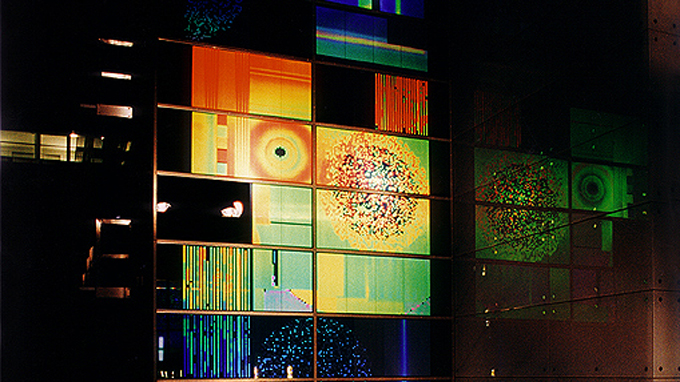Sonderforschungsbereiche und Transregios
 Ansicht der DFG-Geschäftsstelle Bonn. Bild: DFG.
Ansicht der DFG-Geschäftsstelle Bonn. Bild: DFG.
SFB 631 Solid State Based Quantum Information Processing
The Collaborative Research Center 631 studies the physical concepts, materials aspects, and technological foundations of solid-state quantum information processing. This interdisciplinary research field has the potential to revolutionize many areas of science and technology. It deals with the coherent dynamics of solid-state quantum systems and has the daring vision to be able to process and communicate information on the basis of quantum mechanical principles.
- Sprecher:
- Rudolf Gross
- Beteiligung:
- Gerhard Abstreiter, Martin S. Brandt, Ignacio Cirac, Jonathan Finley, Alexander Holleitner, Michael Kaniber, Gregor Koblmüller, Gerhard Rempe, Martin Stutzmann, Peter Vogl
SFB 749 Dynamics and Intermediates of Molecular Transformations
For the improvement of chemical reactions and in order to get a deeper understanding of basic chemical and biochemical processes, the investigation of the dynamic properties of molecules and biomolecules is increasingly necessary. The core of this investigation requires an alliance of chemistry and biochemistry with theoretical and physical chemistry. The common goal of the SFB 749 is to obtain a deeper understanding of reactions and folding mechanisms.
The SFB749 holds a close collaboration with the Excellence Cluster CIPSM.
- Beteiligung:
- Martin Zacharias
SFB 863 Kräfte in biomolekularen Systemen
The major goal of this collaborative research center is to improve our understanding of force-driven mechanical processes in complex biomolecular networks from the single molecule to the whole cell level.
- Sprecher:
- Matthias Rief
- Beteiligung:
- Andreas Bausch, Hendrik Dietz, Thorsten Hugel, Friedrich Simmel, Matthias Zacharias
SFB 1035 Kontrolle von Proteinfunktion durch konformationelles Schalten
Der SFB hat sich zum Ziel gesetzt, die Prinzipien zu bestimmen, die es erlauben, Proteinfunktion durch Strukturumwandlungen zwischen verschiedenen Konformationen zu regulieren. Bisher wurden Aspekte dieser Thematik nur im Kontext spezifischer Studien untersucht, aber nicht mit dem Ziel generelle Prinzipien abzuleiten, die Struktur, Plastizität und Aktivität von Proteinen korrelieren.
- Beteiligung:
- Matthias Rief, Matthias Zacharias
SFB 1258 Neutrinos and Dark Matter in Astro- and Particle Physics
The research focus of the SFB 1258 "Neutrinos and dark matter in astro- and particle physics" lies at the crossroads of particle physics, astrophysics and nuclear physics. It concerns neutrinos, the most abundant matter particles of our universe, and dark matter, that has been driving the dynamics of the universe at galactic scales and beyond. Recent experimental results have propelled our understanding of this interdisciplinary research field to a new level, but key fundamental questions are yet to be answered.
- Sprecherin:
- Elisa Resconi
- Beteiligung:
- Matteo Agostini, Martin Beneke, Shawn Bishop, Laura Fabbietti, Björn Garbrecht, Mathias Garny, Alejandro Ibarra, Susanne Mertens, Lothar Oberauer, Elisa Resconi, Stefan Schönert, Raimund Strauss, Patrick Vaudrevange, Andreas Weiler
SFB/TR 27 Neutrinos and Beyond – Weakly Interacting Particles in Physics, Astrophysics and Cosmology
This SFB/TR centered on several key issues in the study of weakly interacting particles using a coherent and unified approach.
Das Projekt lief von 2007 bis 2010.
- Sprecher:
- Lothar Oberauer
- Beteiligung:
- Allen Caldwell, Franz v. Feilitzsch, Marianne Göger-Neff, Hans-Thomas Janka, Michael Ratz
TR 80 From Electronic Correlations to Functionality
Im Rahmen des Transregios sollen Verfahren und Instrumente entwickelt werden, die neue Perspektiven in der Untersuchung der elektronischen Eigenschaften komplexer homogener und inhomogener Systeme erschließen. Durch die Verzahnung der modernen experimentellen und theoretischen Methoden der beteiligten Partner soll der Transregio ein Forum für die grundlagen- und anwendungsorientierte Erforschung elektronischer Korrelationen und der resultierenden Funktionalitäten werden.
- Sprecher:
- Peter Böni
- Beteiligung:
- Dirk Grundler, Rudolf Hackl, Christoph Hugenschmidt, Wolfgang Kreuzpaintner, Amitesh Paul, Winfried Petry, Christian Pfleiderer, Marc Wilde
SFB/Transregio 110 Symmetrien und Strukturbildung in der Quantenchromodynamik
Der deutsch-chinesische SFB/Transregio 110 behandelt eines der herausfordernsten Probleme in der aktuellen Theoretischen Physik: Die Theorie der starken Wechselwirkung in der Quantenchromodynamik (QCD). Der SFB konzentriert sich hier auf das Auftauchen von Strukturen wie Hadronen oder Atomkernen und die Rolle der Symmetrien in QCD. Dabei wird zum ersten Mal ein einheitlicher Ansatz für hadronische Physik und Kernphysik versucht.
- Beteiligung:
- Martin Beneke, Nora Brambilla, Norbert Kaiser, Stephan Paul, Antonio Vairo